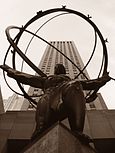- Corporate raid
-
A corporate raid is an American English business term for buying a large interest in a corporation and then using voting rights to enact measures directed at increasing the share value. The measures might include replacing top executives, downsizing operations, or liquidating the company.
By the end of the 1980s, management of many large publicly traded corporations reacted negatively to the threat of potential hostile takeover or corporate raid and pursued drastic defensive measures including poison pills, golden parachutes and increasing debt levels on the company's balance sheet.
In later years, many of the corporate raiders would be re-characterized as "activist shareholders".
Contents
History
History of private equity
and venture capital
Early history
(Origins of modern private equity)
•
The 1980s
(LBO boom)
•
The 1990s
(LBO bust and the VC bubble)
•
The 2000s
(Dot-com bubble to the credit crunch)Corporate raids became the hallmark of a handful of investors in the 1970s and 1980s. Among the most notable corporate raiders of the 1980s were Carl Icahn, Victor Posner, Nelson Peltz, Robert M. Bass, T. Boone Pickens, Harold Clark Simmons, Kirk Kerkorian, Sir James Goldsmith, Saul Steinberg and Asher Edelman. These investors used a number of the same tactics and targeted the same type of companies as more traditional leveraged buyouts and in many ways could be considered a forerunner of the later private equity firms. In fact it is Posner, one of the first "corporate raiders" who is often credited with coining the term "leveraged buyout" or "LBO"[1]
Victor Posner, who had made a fortune in real estate investments in the 1930s and 1940s, acquired a major stake in DWG Corporation in 1966. Having gained control of the company, used it as an investment vehicle that could execute takeovers of other companies. Posner and DWG are perhaps best known for the hostile takeover of Sharon Steel Corporation in 1969, one of the earliest such takeovers in the United States. Posner's investments were typically motivated by attractive valuations, balance sheets and cash flow characteristics. Because of its high debt load, Posner's DWG would generate attractive but highly volatile returns and would ultimately land the company in financial difficulty. In 1987, Sharon Steel entered Chapter 11 bankruptcy protection.[2]
Carl Icahn developed a reputation as a ruthless "corporate raider" after his hostile takeover of TWA in 1985.[3] The result of that takeover was Icahn systematically selling TWA's assets to repay the debt he used to purchase the company, which was described as asset stripping.[4]
Many of the corporate raiders of the 1980s were onetime clients of Michael Milken, whose investment banking firm, Drexel Burnham Lambert helped raise blind pools of capital which corporate raiders could use to make legitimate attempts to take over companies and provide high-yield debt financing of the buyouts.
Ronald Perelman and Revlon
Drexel Burnham raised a $100 million blind pool in 1984 for Nelson Peltz and his holding company Triangle Industries (later Triarc) to give credibility for takeovers, representing the first major blind pool raised for this purpose. Two years later, in 1986, Wickes Companies, a holding company run by Sanford Sigoloff would raise a $1.2 billion blind pool.[5] In later years, Milken and Drexel would shy away from certain of the more "notorious" corporate raiders as the firm and the private equity industry attempted to move upscale.
In 1985, Milken raised a $750 million for a similar blind pool for Ronald Perelman which would ultimately prove instrumental in acquiring his biggest target: The Revlon Corporation. In 1980, Ronald Perelman, the son of a wealthy Philadelphia businessman, and future "corporate raider" having made several small but successful buyouts, acquired MacAndrews & Forbes, a distributor of licorice extract and chocolate, that Perelman's father had tried and failed to acquire 10 years earlier.[6] Perelman would ultimately divest the company's core business and use MacAndrews & Forbes as a holding company investment vehicle for subsequent leveraged buyouts including Technicolor, Inc., Pantry Pride and Revlon. Using the Pantry Pride subsidiary of his holding company, MacAndrews & Forbes Holdings, Perelman's overtures were rebuffed. Repeatedly rejected by the company's board and management, Perelman continued press forward with a hostile takeover raising his offer from an initial bid of $47.50 per share until it reached $53.00 per share. After receiving a higher offer from a white knight, private equity firm Forstmann Little & Company, Perelman's Pantry Pride finally was able to make a successful bid for Revlon, valuing the company at $2.7 billion.[7] The buyout would prove troubling, burdened by a heavy debt load.[8][9][10] Under Perelman's control, Revlon sold 4 divisions: two of which were sold for $1 billion, its vision care division was sold for $574 million and its National Health Laboratories division was spun out to the public market in 1988. Revlon also made acquisitions including Max Factor in 1987 and Betrix in 1989 later selling them to Procter & Gamble in 1991.[11] Perelman exited the bulk of his holdings in Revlon through an IPO in 1996 and subsequent sales of stock. As of December 31, 2007, Perelman still retains a minority ownership interest in Revlon. The Revlon takeover, because of its well-known brand was profiled widely by the media and brought new attention to the emerging boom in leveraged buyout activity.
Decline of the corporate raiders
In the late 1980s several famous corporate raiders suffered from bad investments financed by large amounts of leverage, ultimately losing money for their investors. Additionally, with the fall of Michael Milken and the subsequent collapse of Drexel Burnham Lambert, the credit lines for these investors dried up. By the end of the decade, management of many large publicly traded corporations reacted negatively to the threat of potential hostile takeover or corporate raid and pursued drastic defensive measures including poison pills, golden parachutes and increasing debt levels on the company's balance sheet. Finally, in the 1990s the overall price of the American stock market increased, which reduced the number of situations in which a company's share price was low with respect to the assets that it controlled.
By the end of the 1990s, the corporate raider moniker was used less frequently as private equity firms pursued different tactics than their predecessors. Additionally, with revisionist history, in later years many of the corporate raiders would be re-characterized as "activist shareholders". Carl Icahn received very favorable treatment from his 2008 profile on CBS's 60 Minutes.[12]
Criticism
Opponents of the corporate raid argue that this typically occurs only with well-run companies who are successfully managing their money. In addition, they argue that corporate raids cause large economic disruption and create unemployment as factories are sold off and closed. Proponents of the corporate raid argue that companies which have huge assets and low stock prices are not managing their money well and should either attempt to regain market confidence (thereby boosting their share prices) or else liquidate some of their assets and return the money to their shareholders.
Additionally, the threat of the corporate raid would lead to the practice of "greenmail", where a corporate raider or other party would acquire a significant stake in the stock of a company and receive an incentive payment (effectively a bribe) from the company in order to avoid pursuing a hostile takeover of the company. Greenmail represented a transfer payment from a company's existing shareholders to a third party investor and provided no value to existing shareholders but did benefit existing managers.
Media reflections of corporate raiders
Although private equity rarely received a thorough treatment in popular culture, several films did feature stereotypical "corporate raiders" prominently. Among the most notable examples of private equity featured in motion pictures included:
- Gordon Gekko, Wall Street (1987) and Wall Street: Money Never Sleeps (2008)– The notorious "corporate raider" and greenmailer, Gordon Gekko (played by Michael Douglas), represents a synthesis of the worst features of various famous private equity figures. In the film, the character intends to manipulate an ambitious young stockbroker to take over a failing, but decent, airline. Although Gekko makes a pretense of caring about the airline, his intentions prove to be to destroy the airline, strip its assets and lay off its employees before raiding the corporate pension fund. Gekko would become a symbol in popular culture for unrestrained greed (with the signature line, "Greed, for lack of a better word, is good") that would be attached to the private equity industry.
- "Larry the Liquidator", Other People's Money (1990) – A self-absorbed corporate raider "Larry the Liquidator" (Danny DeVito), sets his sights on New England Wire and Cable, a small-town business run by family patriarch Gregory Peck who is principally interested in protecting his employees and the town.
- Edward Lewis, Pretty Woman (1990) – Corporate raider Edward Lewis (Richard Gere) attempts to make a hostile takeover of Morse Industries. Edward explains what he does for a living to Vivian (Julia Roberts): he buys large companies that are on the verge of bankruptcy, breaks them up and sells them in smaller parts, at a price that's more than the whole company, for profit.
- On the soap opera General Hospital, character Jasper Jacks is a corporate raider.
References
- ^ Trehan, R. (2006). The History Of Leveraged Buyouts. December 4, 2006. Accessed May 22, 2008
- ^ http://news.google.com/newspapers?nid=1346&dat=19870418&id=u7cwAAAAIBAJ&sjid=qfsDAAAAIBAJ&pg=5861,942763
- ^ 10 Questions for Carl Icahn by Barbara Kiviat, TIME magazine, Feb. 15, 2007
- ^ TWA - Death Of A Legend by Elaine X. Grant, St Louis Magazine, Oct 2005
- ^ Bruck, Connie (1988), The Predators' Ball: The junk-bond raiders and the man who staked them, New York: Simon and Schuster, pp. 117–118, ISBN 067161780X.
- ^ Hack, Richard (1996), When Money Is King, Beverly Hills, CA: Dove Books, p. 13, ISBN 0787110337.
- ^ Stevenson, Richard (November 5, 1985), "Pantry Pride Control of Revlon Board Seen Near", New York Times: D5, http://www.nytimes.com/1985/11/05/business/pantry-pride-control-of-revlon-board-seen-near.html, retrieved April 27, 2007
- ^ Hagedom, Ann (March 9, 1987), "Possible Revlon Buyout May Be Sign Of a Bigger Perelman Move in Works", Wall Street Journal: 1.
- ^ Gale Group (March 8, 2005), "Revlon Reports First Profitable Quarter in Six Years", Business Wire, http://findarticles.com/p/articles/mi_m0EIN/is_2005_March_8/ai_n11853855/, retrieved February 7, 2007.
- ^ Timberlake, Cotten & Chandra, Shobhana (March 8, 2005), "Revlon profit first in more than 6 years", USA Today, http://www.usatoday.com/money/companies/earnings/2005-03-08-revlon-usat_x.htm, retrieved March 20, 2007.
- ^ "MacAndrews & Forbes Holdings Inc.", Funding Universe, http://www.fundinguniverse.com/company-histories/MacAndrews-amp;-Forbes-Holdings-Inc-Company-History.html, retrieved May 16, 2008
- ^ The Icahn Lift: 60 Minutes' Lesley Stahl Profiles The Billionaire Investor 60 Minutes, March 9, 2008.
Further reading
- Wayne, Leslie (January 4, 1988), "Takeovers Revert to the Old Mode", New York Times, http://www.nytimes.com/1988/01/04/business/takeovers-revert-to-the-old-mode.html.
Corporate finance and investment banking Capital structure 
Transactions
(terms / conditions)Initial public offering (IPO) · Secondary market offering (SEO) · Follow-on offering · Rights issue · Private placement · Spin out · Equity carve-out · Greenshoe (Reverse) · Book building · Bookrunner · UnderwriterValuation Financial modeling · Free cash flow · Business valuation · Fairness opinion · Stock valuation · APV · DCF · Net present value (NPV) · Cost of capital (Weighted average) · Comparable company analysis · Accretion/dilution analysis · Enterprise value · Tax shield · Minority interest · Associate company · EVA · MVA · Terminal value · Real options valuationSee also: template Aspects of occupations · template Aspects of organizations · template Aspects of workplaces · template Corporate titlesAbuse · Appointeeship · Censorship · Citizenship · Communication · Crime · Design · Entertainment · Ethics · Identity · Interlocks · Liability · Narcissism · Nationalism · Opportunity · Pathos · Promoter · Propaganda · Raid · Recovery · Resolution · Scandal · Security · Services · Social entrepreneurship · Social media · Social responsibility · Sourcing · Statism · Sustainability · Synergy · Tax · Taxonomy · Title · Trainer · Transparency · Travel · Trust · Veil · VideoCategories:
Wikimedia Foundation. 2010.

